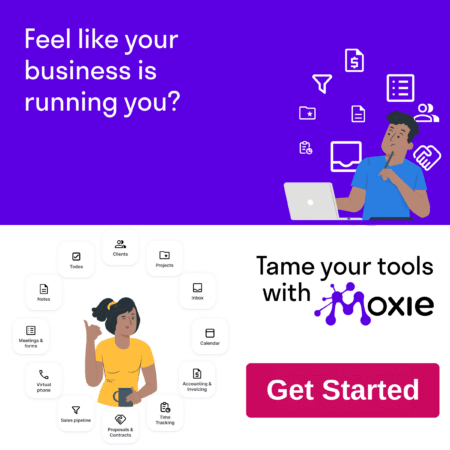To go from freelancer to agency is a big step. Along with the change come lots of new and exciting challenges as well as a huge potential for revenue increase.
But money’s not the only reason to go from freelancer to agency. You might be wishing for more free time, higher revenue, or the rush of building something bigger than yourself.
Whatever your reason for wanting to go from freelancing to building an agency, we’re on your side.
We’re the hosts of the Freelance to Founder podcast and we’ve coached 100+ guests working on going from freelancer to agency. Needless to say, we’ve learned a thing or two along the way.
Oh, we’ve also had our own journey going from being freelancers to building agencies multiple times—and have even sold some of our businesses for a nice exit.
So today, we’d like to break down some of the top things we’ve seen freelancers get right (and some wrong) when it comes to going from freelancer to agency.
Let’s dive in.
1. Treat yourself like an agency
Before we dive into the highly tactical stuff, it’s important that you understand: 90% of this change from freelancer to agency is in your mind.
Honestly, you can “make the change” right now. Nothing’s stopping you.
Just start using the word “we” when talking about your business and consider using a business name vs your own name.
Of course, there’s a lot more to it than that (hence the rest of this article) but it all starts with you treating yourself like, talking about yourself like, and acting as an agency instead of a freelancer.
Okay, now to the tactical stuff:
2. Build up your client pipeline
Before you can even hope to go from freelancer to agency, you’ll need the business and revenue to support the change.
In fact, having too much work is one clear sign it’s time to go from being a freelancer to building your own agency model instead.
If you already have more work than you can handle, it’s time to crush those doubts and move forward.
If you don’t have enough clients yet, try listening to this podcast episode with Caroline where we talk all about marketing and sales at scale.
You can also read our guide on getting more clients.
3. Create systems for handling client intake
Once you have a steady stream of client leads coming in, you have to make sure you take good care of them. In order to go from freelance to agency, you’ll need to get really good at closing the sale.
For starters, have a listen to this episode where we explain how to close 90% of potential clients without filling out endless proposals.

From there, you’ll need to build your own client onboarding process to convert as many leads into paying clients as possible
Here are a few key things to remember when building your own system:
Filter out bad clients early on
The last thing you want is a bunch of unqualified clients clogging up your pipeline and wasting your time. You have to make sure you’re attracting the right clients.
Focus on conversion
Remember, the point of your marketing efforts is not to get more Instagram followers or more traffic to your blog. The point is to close more sales and get more clients.
Find what works and do more of it
You don’t have to be everywhere all the time. If Pinterest just isn’t a worthwhile marketing channel for you, then stop spending time and effort there.
4. Perfect your process for delivering client projects
Making the sale is really only the beginning if you’re going to scale from freelancer to agency.
Once your client has signed an agreement or shaken your hand, the real work begins.

Your process will change over time as you (and eventually your team) learn what it takes to complete a project efficiently.
For starters, here are a few key questions you might want to ask yourself about your process:
- What are all the individual tasks that must be completed in order to deliver a quality project.
- Who “owns” which parts of the process? Who will ultimately be responsible for its success?
- Which triggers activate the next step in my process? When will the next person know it’s their turn to make progress?
- Who determines deadlines and how are they communicated to everyone involved?
- How do my team members and I know when to work on which projects?
- Who communicates with the client during the process when questions or concerns arise?
- Who decides when a project is ready to send to the client?
- What happens after a project is completed, approved, and finalized?
You might also want to consider using some kind of project management software to keep your projects moving forward and keep everyone on the same page.
5. Get organized and legally covered
At some point, you’re going to need to legally set yourself up as a company—instead of a sole proprietor.
Some articles put this section at the very beginning of their tips for going from freelancer to agency.

Not us.
We think a lot of people trying to make the switch from being a freelancer to growing a business worry about this too soon.
I ran my business for 7 years as a sole proprietor before finally setting up an LLC. I had as many as 8 independent contractors working on my team and it was fine.
But if you’re serious about running an agency (meaning, you have sales coming in and processes working smoothly) you’ll need to upgrade from a sole proprietorship to LLC.
This is particularly true if you want to hire full-time employees who you put on payroll.
To be clear, you DON’T have to hire full-time employees. In fact, one podcast guest named Karl blew us away when he told us he had hired over 50 independent contractors in his first year transitioning from freelancer to agency.
In addition to setting up an LLC (or other legal entity) you’ll want to look into business licenses and other permits you need from your local, regional, and national governments in order to operate a business legally.
6. Hire for revenue-generating positions
Now that you’re moving along, the next step on the journey from freelancer to an agency is to hire.
You can choose to hire part-time employees or contractors in the beginning if that’s the best fit for you.
Or you can hire full-time employees if you have the confidence your business can sustain it.
Whichever option you choose, our advice is to hire for revenue-generating positions.
When you’re a freelancer building an agency, it can be tempting to hire traditional service providers first: attorneys, accountants, etc.
The truth is: these are money-takers, not money-makers.
I’m not saying you don’t need an accountant or an attorney eventually. I’m saying maybe start with something like Freshbooks or Quickbooks for accounting/bookkeeping and something like BetterLegal for help with legal stuff.
In the meantime, hire people who will generate revenue for you. You essentially have two options:
- Hire people who work on billable hours.
- Hire people who work in sales/marketing.
Positive cash flow is king when it comes to graduating from freelancer to agency and focusing on money in the door when hiring is a great first step.
7. Shift your focus to sales and marketing
Whether you choose to hire a sales and marketing person or not, your new job as an agency owner is to shift your attention from work product and execution to sales and marketing.
Of course, the quality of your service is perhaps your most important marketing tool so don’t neglect it for any reason.
But as an entrepreneur, you should be thinking constantly about how to get more sales in the door.
What many people do wrong when trying to go from freelancer to agency is to focus on the work product ONLY.
That’s a quick route to bankruptcy.
However, if you absolutely can’t stand the idea of focusing on sales while other people do the creative work you’re used to doing as a freelancer, you can try to hire a sales and marketing person to join your team.
This is often difficult to do right and can be very costly. But if you find the right salesperson, it can pay off in spades.
8. Watch your numbers like a hawk
Finally, your new job as an agency owner is to watch your numbers like your life depends on them.
In a way, it does. And so does the livelihood of all the people you’ve employed as you’ve grown from freelancer to agency.
People are counting on you to keep them employed. If you let sales slip or decline too far, there’s more at stake than just your own income.
There’s nothing worse than having to let people go and reduce expenses. This course has killed more than enough agencies.
9. Have fun!
Growing your own agency can be stressful at times. So don’t forget to take a step back every once in a while and realize how far you’ve come on your journey from freelance to agency builder.
Growing an agency can be one of the most exhilarating and entertaining things to do in business.
You get to build a talented team, work with interesting clients, create revenue from scratch, and build your own small empire in whatever field you love to work in.
When it comes to working, there’s nothing better.
So have some fun. You work hard and deserve to smile.
What’s next?
After reading this full guide on moving from freelancer to agency, you might be asking yourself:
“Okay… so…. Now what?”
Here are a few great next steps:
You’ve got this! Good luck.
Keep the conversation going…
Over 10,000 of us are having daily conversations over in our free Facebook group and we’d love to see you there. Join us!
